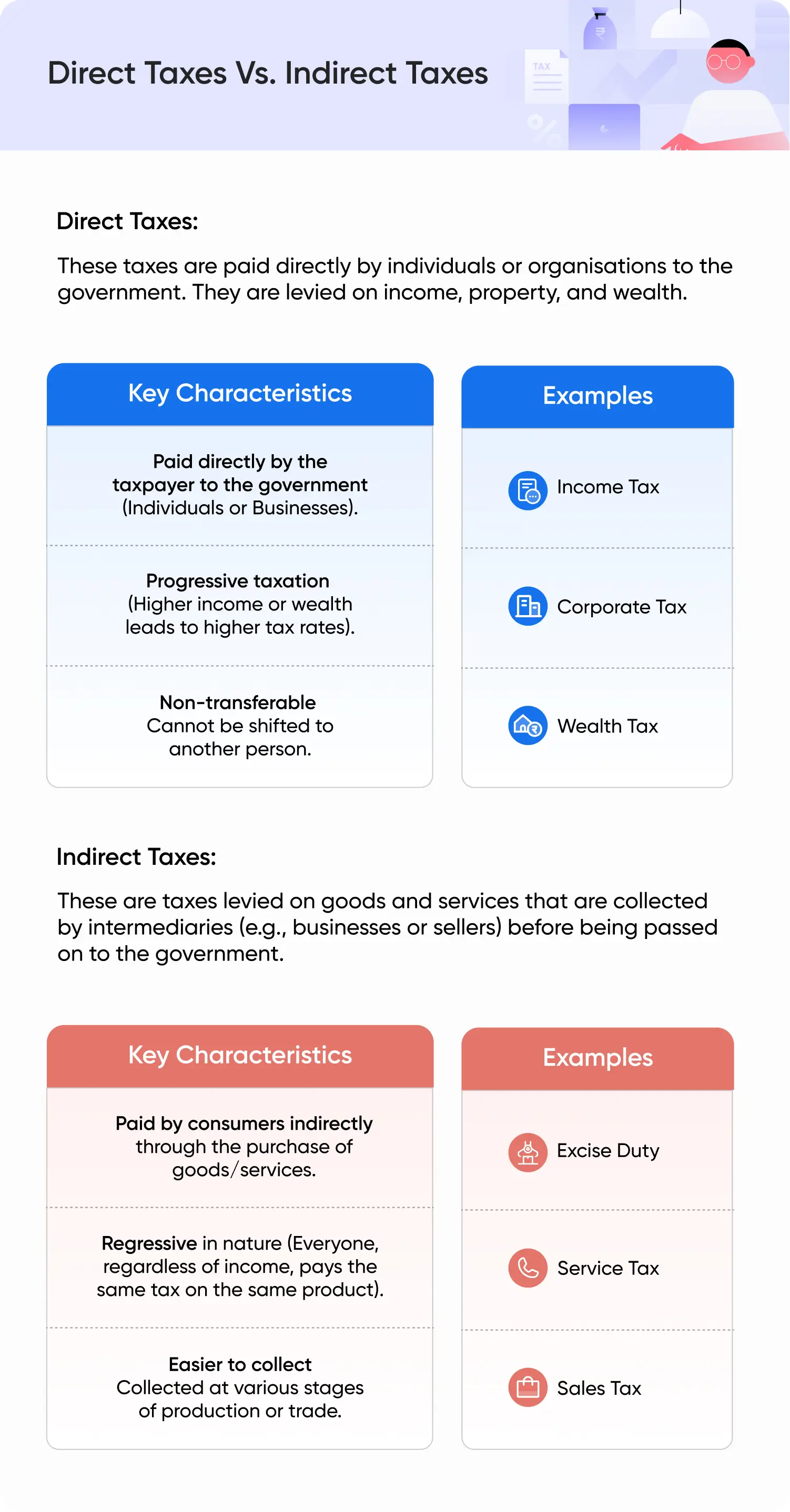Types Of Taxes In India: Direct Tax And Indirect Tax
Types of taxes in India are broadly classified into direct taxes, such as income tax, and indirect taxes, such as GST and customs duty. Direct taxes are paid directly by individuals or entities to the government. Indirect taxes are collected through goods and services, with the burden passed on to the end consumer. Understanding the types of taxes helps taxpayers comply with laws and plan their finances effectively.
Types Of Taxes In India
India’s tax structure is divided into direct taxes and indirect taxes. Direct taxes, governed by the Central Board of Direct Taxes (CBDT), are levied on income or profits, and the burden cannot be transferred to others. Indirect taxes, administered by the Central Board of Indirect Taxes and Customs (CBIC), are imposed on goods and services and can be passed along the supply chain to the end consumer.
Direct Taxes
Direct tax is levied on people's income or profits. For example, a taxpayer pays the government for different purposes, including income tax, personal property tax, FBT, etc. The burden has to be borne by the person on whom the tax is levied and cannot be passed on to someone else. The Central Board of Direct Taxes (CBDT) governs and administers the Direct Tax.
Indirect Taxes
Indirect tax is levied by the government on goods and services. Therefore, the tax burden can be shifted on the end consumer. For example, the wholesaler can pass it on to retailers, who then pass it on to customers. Therefore, customers bear the final burden of indirect taxes. The Central Board of Indirect Taxes and Customs (CBIC) governs and administers indirect taxes.
Taxes | ||
| Direct Taxes | Indirect Taxes | Other Taxes |
| Income Tax | Sales Tax | Property Tax |
| Corporate Tax | Service Tax | Registration Fees |
| Securities Transaction Tax | Octroi Duty | Toll Tax |
| Capital Gains Tax | Custom Duty | Education Cess |
| Gift Tax | Value Added Tax (VAT) | Entertainment Tax |
| Wealth Tax | Goods & Services Tax (GST) | Professional Tax |
Types Of Indirect Taxes And Direct Taxes In India
Here is a list of major types of Indirect taxes:
- Goods and Service Tax- (GST) is an indirect tax levied on various goods and services. One significant benefit of GST is that it eliminates the tax-on-tax or cascading effect of the previous tax regime.
- Excise duty- Is a tax imposed on licensing, sale or production of certain goods produced within the country.
However, with the introduction of GST, excise duty, service value-added tax, and tax (VAT), state/central sales tax on most goods /services has been replaced by GST.
Here is the list of types of Direct taxes:
- Income tax- It is a type of tax imposed on the profits and income earned during the year. Income tax is the most common example of direct tax. As the term “income tax” suggests, it is a tax levied by the Central government on income generated by individuals and businesses in a particular financial year. However, the amount payable for your income tax depends on how much money you earn under different heads of income. Additionally, for a financial year, income tax applies to those with an annual income exceeding the basic exemption limit applicable to them.
In addition, other examples of direct and indirect tax include corporate tax, value-added tax, customs duty, and many more.

Now that you know about some common types of direct and indirect taxes, it is essential to understand the pros and cons of direct and Indirect taxes.
Advantages And Disadvantages Of Direct Tax
| Advantages | Disadvantages |
| Individuals with lower incomes pay lower taxes than people with higher incomes, i.e, progressive in nature. | Fraudulent practices through which taxpayers often pay lower taxes or avoid taxes. |
| Curbs inflation and reduces inequalities. | The documentation process can be complex and time-consuming |
| Sense of certainty as both the government and taxpayer are aware of what and when to be paid. | The burden cannot be transferred to any other in the chain. |
Advantages And Disadvantages Of Indirect Tax
| Advantages | Disadvantages |
| Every Individual contributes to nation-building | Increase in overall price of goods and services |
| Easily collectable from the end consumer | Consumers often lack knowledge of the taxes paid |
| Fair Distribution of tax, i.e, essential goods are charged lesser compared to goods that are luxurious. | It is regressive in nature. |
| The burden of paying can be transferred to the end consumer. | The amount received in tax is often unpredictable as the tax paid depends on the goods and services purchased |
Difference Between Direct Tax And Indirect Tax
| Basis | Direct Tax | Indirect Tax |
| Definition | Tax levied directly on an individual’s or entity’s income or profits. | Tax levied on the supply of goods and services. |
| Burden of Tax | Cannot be shifted; borne by the person on whom it is imposed. | Can be shifted to another party; ultimately borne by the end consumer. |
| Governing Body | Central Board of Direct Taxes (CBDT). | Central Board of Indirect Taxes and Customs (CBIC). |
| Examples | Income Tax, Corporate Tax, Property Tax. | GST, Customs Duty, Excise Duty. |
| Impact on Prices | Does not directly affect the price of goods and services. | Increases the price of goods and services. |
| Payment | Paid directly to the government by the taxpayer. | Collected by an intermediary (seller/service provider) and paid to the government. |
Now that you are aware of the different types of taxes in India, you will have a better idea of the types of taxes you are paying.
Related Articles
